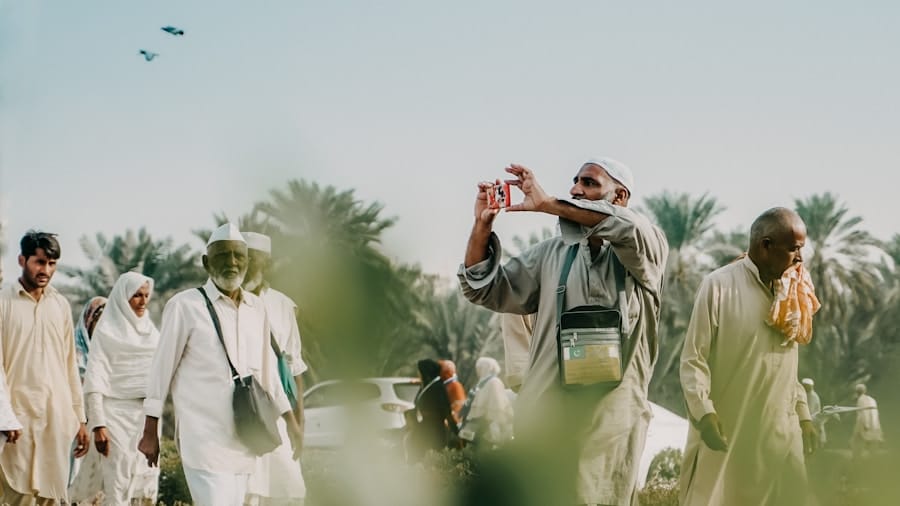The Hajj is a spiritual journey that holds immense significance in the lives of Muslims around the world. It is a pilgrimage to the holy city of Mecca, which is one of the Five Pillars of Islam and is obligatory for all able-bodied Muslims to undertake at least once in their lifetime. The Hajj is a time for spiritual reflection, self-discipline, and devotion to Allah. It is a time to seek forgiveness for past sins and to purify the soul. The journey of Hajj is a physical and emotional test, as pilgrims endure long days of walking, intense heat, and crowded conditions. However, the rewards of completing the Hajj are immeasurable, as it is believed to cleanse the soul and bring the pilgrim closer to Allah.
The spiritual journey of Hajj is a deeply personal experience for each individual. It is a time for self-reflection and introspection, as pilgrims seek to strengthen their faith and renew their commitment to Islam. The rituals of Hajj, such as circling the Kaaba, throwing stones at the devil, and standing on Mount Arafat, are symbolic acts that represent the struggles and triumphs of Prophet Ibrahim and his family. These rituals serve as a reminder of the importance of faith, sacrifice, and obedience to Allah. The spiritual journey of Hajj is a transformative experience that leaves a lasting impact on the hearts and minds of those who undertake it.
Navigating the Transition from Hajj to Life in the USA
After completing the spiritual journey of Hajj, many pilgrims face the challenge of transitioning back to their daily lives in the USThe return from Hajj can be a time of mixed emotions, as pilgrims struggle to readjust to their normal routines after experiencing the spiritual highs of the pilgrimage. The transition from Hajj to life in the USA can be difficult, as pilgrims may feel a sense of disconnection from their spiritual journey and struggle to maintain the same level of devotion and piety. It is important for pilgrims to find ways to integrate the lessons and experiences of Hajj into their daily lives in the USA, in order to maintain their spiritual growth and connection to Allah.
One way to navigate the transition from Hajj to life in the USA is to seek support from fellow pilgrims and members of the local Muslim community. By sharing their experiences and struggles with others who have also completed the Hajj, pilgrims can find comfort and guidance in knowing that they are not alone in their journey. It is also important for pilgrims to continue practicing the rituals and acts of worship that they performed during Hajj, such as daily prayers, fasting, and giving to charity. By maintaining these religious practices, pilgrims can keep the spirit of Hajj alive in their hearts and minds as they navigate the challenges of returning to life in the USA.
Maintaining a Sense of Connection and Community
Maintaining a sense of connection and community is essential for pilgrims who have returned from Hajj to life in the USThe experience of Hajj can be a deeply personal and transformative journey, but it is important for pilgrims to stay connected to their fellow Muslims and seek support from their local community. By participating in regular gatherings, events, and activities at the mosque or Islamic center, pilgrims can continue to foster a sense of belonging and unity with their fellow believers. It is also important for pilgrims to stay connected with their families and friends, sharing their experiences and lessons learned from Hajj with those closest to them.
In addition to maintaining connections with their local community, pilgrims can also seek out opportunities for volunteer work and charitable activities. By giving back to those in need, pilgrims can continue to embody the spirit of compassion and generosity that they experienced during Hajj. This can also help pilgrims stay connected to their faith and maintain a sense of purpose and fulfillment in their lives. By staying connected to their community and engaging in acts of service, pilgrims can continue to grow spiritually and find support and encouragement as they navigate life in the USA after completing the Hajj.
Balancing Religious Practices with Daily Responsibilities
Balancing religious practices with daily responsibilities can be a challenge for pilgrims who have returned from Hajj to life in the USThe demands of work, family, and other obligations can make it difficult for pilgrims to maintain the same level of devotion and piety that they experienced during Hajj. However, it is important for pilgrims to find ways to integrate their religious practices into their daily lives in order to stay connected to their faith and continue growing spiritually. This may require making adjustments to their schedules and priorities in order to prioritize acts of worship and devotion.
One way for pilgrims to balance religious practices with daily responsibilities is to establish a routine for prayer, fasting, and other acts of worship. By setting aside specific times each day for these religious practices, pilgrims can ensure that they are able to fulfill their obligations while also attending to their other responsibilities. It is also important for pilgrims to seek support from their families and employers in order to create an environment that is conducive to practicing their faith. By communicating their needs and priorities with those around them, pilgrims can find ways to strike a balance between their religious practices and daily responsibilities.
Reflecting on the Lessons Learned from Hajj
Reflecting on the lessons learned from Hajj is an important part of integrating the experience into life in the USThe spiritual journey of Hajj is filled with profound teachings and insights that can have a lasting impact on the hearts and minds of pilgrims. By taking time to reflect on their experiences during Hajj, pilgrims can gain a deeper understanding of themselves, their faith, and their relationship with Allah. This reflection can help pilgrims identify areas for personal growth and development, as well as inspire them to make positive changes in their lives.
One way for pilgrims to reflect on the lessons learned from Hajj is to keep a journal or diary where they can record their thoughts, feelings, and experiences during the pilgrimage. By writing down their reflections, pilgrims can gain clarity and insight into the significance of their journey and the impact it has had on them. It is also important for pilgrims to engage in discussions with fellow believers about their experiences during Hajj, sharing their insights and lessons learned with others who may benefit from their wisdom. By reflecting on the lessons learned from Hajj, pilgrims can continue to grow spiritually and find meaning and purpose in their lives.
Overcoming Challenges and Obstacles in Adjusting to Life in the USA
Adjusting to life in the USA after completing Hajj can present many challenges and obstacles for pilgrims. The return from Hajj can be a time of adjustment as pilgrims readjust to their normal routines while also trying to maintain the spiritual growth they experienced during the pilgrimage. It is common for pilgrims to face challenges such as feelings of disconnection from their spiritual journey, difficulty integrating back into daily life, or struggling with maintaining religious practices amidst other responsibilities. However, by recognizing these challenges and actively seeking solutions, pilgrims can overcome these obstacles and find peace and contentment in their lives.
One way for pilgrims to overcome challenges in adjusting to life in the USA is by seeking support from their local Muslim community. By connecting with fellow believers who have also completed Hajj, pilgrims can find comfort in knowing that they are not alone in their struggles. It is also important for pilgrims to seek guidance from religious leaders or mentors who can provide advice and support as they navigate this transition period. Additionally, by staying connected with family members and friends who understand their experiences, pilgrims can find emotional support that will help them overcome any challenges they may face.
Finding Peace and Contentment in the Midst of Change
Finding peace and contentment in the midst of change is essential for pilgrims who have returned from Hajj to life in the USThe transition from Hajj back into daily life can be challenging as pilgrims navigate changes in routine, responsibilities, and emotions. However, by focusing on maintaining a strong connection with Allah and seeking support from their community, pilgrims can find peace and contentment amidst these changes. It is important for pilgrims to remember the lessons learned during Hajj – such as patience, gratitude, and reliance on Allah – as they face new challenges in life.
One way for pilgrims to find peace and contentment in the midst of change is by engaging in acts of worship that bring them closer to Allah. By prioritizing prayer, recitation of Quran, fasting, and other religious practices, pilgrims can find solace and strength in their faith during times of uncertainty or difficulty. It is also important for pilgrims to seek out opportunities for spiritual growth through learning about Islam, attending religious lectures or classes, or engaging in acts of service within their community. By staying connected with Allah and seeking opportunities for growth, pilgrims can find peace and contentment as they navigate life in the USA after completing Hajj.
In conclusion, the spiritual journey of Hajj holds immense significance for Muslims around the world. The pilgrimage is a time for self-reflection, devotion, and renewal of faith that leaves a lasting impact on those who undertake it. Navigating the transition from Hajj back into daily life in the USA presents many challenges for pilgrims, but by seeking support from their community, reflecting on their experiences, maintaining religious practices, overcoming obstacles, and finding peace amidst change, they can continue growing spiritually while finding contentment in their lives. The lessons learned from Hajj serve as a guide for how pilgrims can integrate their experiences into daily life while maintaining a strong connection with Allah and finding fulfillment within themselves.

